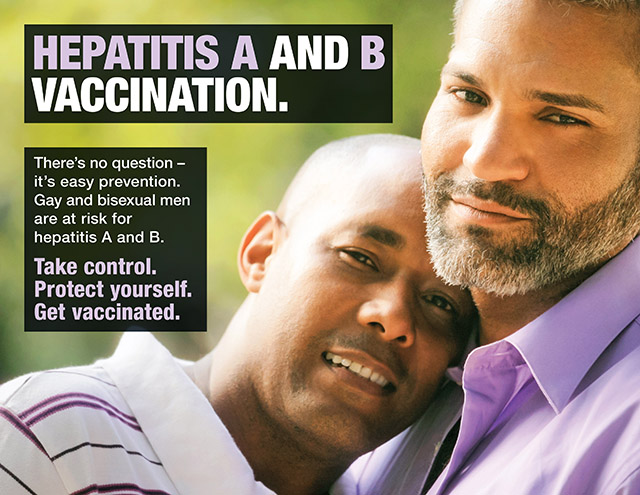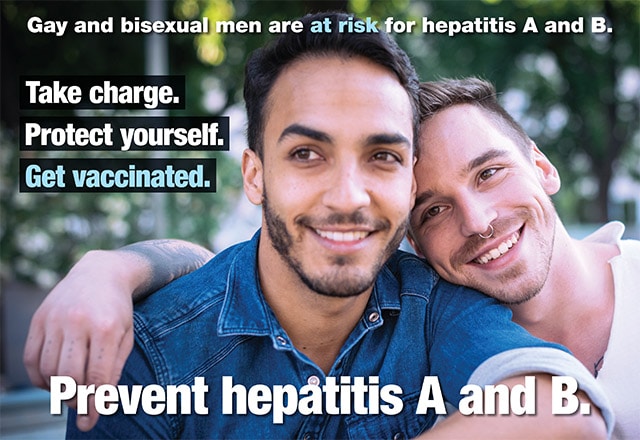Protect Yourself – Get Vaccinated Against Hepatitis A and Hepatitis B

Gay and bisexual men are at risk for hepatitis A and B.
CDC recommends gay and bisexual men get vaccinated against both hepatitis A and hepatitis B. Despite this recommendation, adult vaccination rates are low and many men are at risk of getting infected. Widespread outbreaks of hepatitis A are occurring across the United States and some of these outbreaks are affecting men who have sex with men. In addition, cases of hepatitis B are on the rise in many states. As a result, getting vaccinated for hepatitis A and hepatitis B is critical to ensure protection.

Both hepatitis A and hepatitis B can be prevented with safe, effective vaccines. It is important to get vaccinated to protect your health and prevent spreading the disease to others.
The hepatitis A and hepatitis B vaccines can be given separately or as a combination vaccine. All the shots in the series are needed for long-term protection. The full series of the hepatitis A and hepatitis B vaccines require 2-3 shots, depending on the type of vaccine.
Learn more about hepatitis A and hepatitis B.
| Hepatitis A | Hepatitis B | |
|---|---|---|
| Virus can be found in |
|
|
| Virus is spread by | Ingesting the virus – even in microscopic amounts – through close personal contact, sex with an infected person, and eating contaminated food or drink. | Sharing needles, syringes, other equipment and surfaces used to prepare and inject drugs. |
| Easily transmitted during sex | ||
| How do you know if you are infected? | Not everyone with hepatitis A has symptoms. Adults are more likely to have symptoms than children. If symptoms develop, they usually appear 2 to 7 weeks after infection. | Many people with hepatitis B do not have symptoms and do not know they are infected. |
| If symptoms occur, they can include yellow skin or eyes, not wanting to eat, upset stomach, throwing up, stomach pain, fever, dark urine, light-colored stool, joint pain, and feeling tired. People can also have diarrhea with hepatitis A. | ||
| How serious can it be? | People can be sick for a few weeks to a few months. Most people recover without liver damage. In some cases, people have been hospitalized and even died. | While many adults infected with hepatitis B can resolve their infection without treatment, some do go on to develop a chronic, or lifelong illness. Chronic hepatitis B can develop into a serious disease resulting in long-term health problems, including liver damage, liver failure, liver cancer, or even death. |
| What are treatments? | To treat the symptoms of hepatitis A, doctors usually recommend rest, adequate nutrition, and fluids. Some people will need medical care in a hospital. | If needed, treatments for chronic hepatitis B can slow down or delay liver damage and reduce the risk of liver cancer. |

Outreach Resources
Resources are available to encourage vaccination in gay and bisexual men including posters you can print and customize with local information and digital tools you can use for social media, websites, dating apps, and more.
- chat icon
- chat icon
- email icon